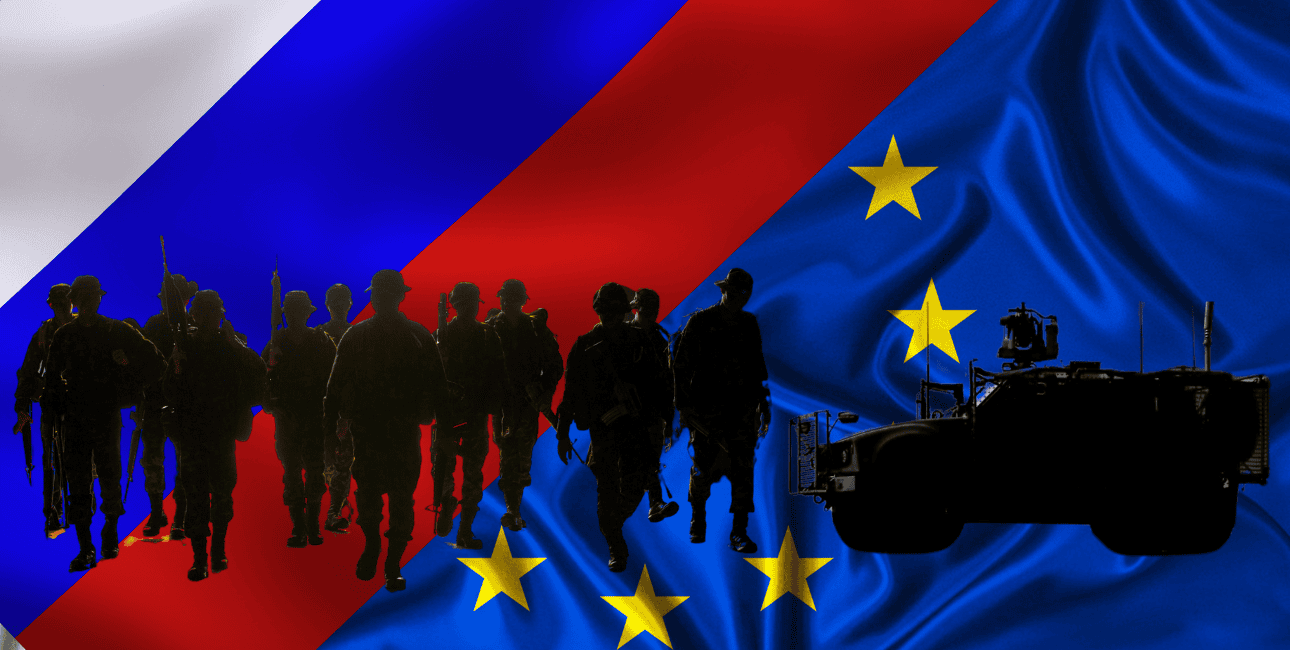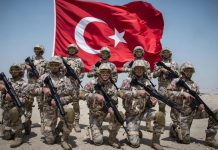According to a noted Ukrainian-born British journalist and author, Russian President Vladimir Putin’s ambitions go far beyond Ukraine.
In a striking warning, Peter Pomerantsev asserted, “After Ukraine, Putin’s next step will be to destroy the European Union”—a move he believes the Kremlin leader is preparing for with the tacit or indirect support of both China and the current Trump administration.
Pomerantsev, a prominent expert on propaganda and authoritarianism, views Russia’s full-scale invasion of Ukraine in 2022 not as an isolated conflict but as a key stage in Putin’s long-term vision to restore and expand Russian power.
In an interview with L’Express, a French weekly news magazine headquartered in Paris, he described this as the centerpiece of what may well be the Russian leader’s life’s work.
“Putin sees himself as the greatest Russian leader since Peter the Great,” Pomerantsev said. “He’s not just trying to reclaim Ukraine—he’s chasing a broader legacy of imperial resurgence. Ukraine is only the beginning; it represents his wider ambitions for global influence and territorial expansion.”
“Next Target: Europe’s Unity”
According to Peter Pomerantsev, Vladimir Putin envisions a world reshaped by strongmen—himself included—who carve it up into spheres of influence, echoing the colonial empires of the 19th century.
In Putin’s mind, the postwar global order that has lasted from 1945 to 2025 is already obsolete. “And Russia,” Pomerantsev asserts, “is one of those who will shape the next world.”
According to Pomerantsev, Putin’s next target will be the European Union, a challenge he sees as straightforward due to the EU’s existing vulnerabilities. What makes this even more alarming, he argues, is that Putin is not alone in this ambition—he believes President Donald Trump shares his disdain for the European Union and its unity.

“Both Moscow and Trump’s Washington prefer dealing with individual nations one-on-one—smaller, more pliable, easier to manipulate. They reject the idea of a united Europe, especially one capable of coordinating sanctions or pushing back collectively.”
Pomerantsev warns that the ultimate goal isn’t necessarily to destroy the EU outright, but to paralyze it—to render its decision-making machinery so ineffective that it becomes irrelevant. “Russia and the United States are moving in the same direction here,” he adds. “Will they succeed? I can’t say for sure. But what is certain is this: Europe has no idea what’s coming.”
Who Is Peter Pomerantsev?
Peter Pomerantsev is one of the most incisive voices analyzing modern authoritarianism, propaganda, and the manipulation of truth in the digital age, especially as it pertains to Russia.
Born in Soviet Ukraine in 1977, his family relocated to the United Kingdom when he was just nine months old. He is currently a researcher at Johns Hopkins University, Baltimore, Maryland.
From 2017 to 2020, he served as a senior fellow at the London School of Economics and Political Science, where he also led the Arena Initiative—an ambitious research project aimed at tackling the challenges of digital disinformation and political polarization.
In addition to his academic work, he writes regularly for esteemed publications like The New York Times, Granta, The Atlantic, and The American Interest.
Pomerantsev’s literary contributions include his critically acclaimed books on Russian propaganda. His first, Nothing Is True and Everything Is Possible (2014), explores the surreal and often disorienting world of Russian media and politics, drawing from his experiences in Russia’s television industry.
This book won the 2016 Royal Society of Literature Ondaatje Prize and has been translated into over a dozen languages. His second book, This Is Not Propaganda (2019), was named a Times Book of the Year and further cements his reputation as a leading authority on the mechanics of modern media warfare.
In addition to his writing, Pomerantsev regularly hosts policy seminars at prestigious institutions like NATO, the EU, the UK Foreign and Commonwealth Office, the German Foreign Office, and the U.S. State Department.
Since 2022, he has been working with The Reckoning Project: Ukraine Testifies, helping document Russian war crimes amid the ongoing conflict in Ukraine.
Pressuring Putin: What Leverage Remains?
Peter Pomerantsev believes the West has not yet fully exhausted its options in containing Vladimir Putin’s regime. In his analysis, he outlines several strategic levers that remain at the disposal of Western powers to challenge the Kremlin’s dominance.
One crucial lever, according to Pomerantsev, is energy—specifically the impact of oil revenues. The funds from Russia’s oil exports, which sustain its military campaign against Ukraine, have been indirectly targeted by the tariff war initiated by Donald Trump.
Pomerantsev emphasizes the political significance of oil prices and the ruble’s value, noting their profound influence on the Russian populace’s political psychology.
However, he warns that “Putin’s political destiny is tightly intertwined with global oil prices.” The West, he argues, also has a vested interest in subtly weakening the alliance between Russia and China—an alliance that, despite appearances, is more fragile than many believe.
And with time running out, particularly for Europeans, Pomerantsev stresses that decisive action is more urgent than ever.
Why Washington’s Role Under The Microscope?
Donald Trump once claimed he could end the war in Ukraine within 24 hours. But just three months into his return to the White House, that promise appears increasingly hollow. His proposed ceasefire plan is faltering, undermined by the relentless escalation of Russia’s military offensive.
Despite a flurry of diplomatic efforts, including a third visit to Moscow by Trump’s special envoy Steve Witkoff, no breakthroughs have been achieved. Witkoff returned to Washington empty-handed, and U.S. officials are now signaling they may walk away from the talks altogether if no progress is made soon.
Meanwhile, Ukrainian President Volodymyr Zelensky continues to urge the international community to intensify pressure on Moscow. “Only increased pressure on the Kremlin,” he reiterated, “can end this war and bring about a lasting peace.”
A Fragile Future For Europe Amid Shifting Powers
While Peter Pomerantsev’s warnings may strike some as alarmist or speculative, they cannot be dismissed out of hand.
In an era defined by geopolitical realignments, economic interdependence, and intensifying technological rivalries, the strategic landscape is shifting rapidly and unpredictably. What once seemed far-fetched is increasingly plausible in a world where the old certainties no longer hold.
Europe is experiencing its most devastating conflict since World War II, and with it, the collapse of a post-Cold War model built on three pillars: cheap Russian energy, American security guarantees, and access to Chinese markets.
The war in Ukraine has shattered that foundation, prompting the European Union to reimagine itself as a geopolitical actor.
This transformation is far from smooth. The EU, which has long relied on US military support, is now grappling with the imperative to develop autonomous defense capabilities.
At the same time, its relationship with China has soured. Once primarily defined by trade and investment, EU-China relations have been strained by growing concerns over Beijing’s coercive diplomacy, market distortions, and its alignment with Moscow. China’s continued embrace of Russia, even as the Kremlin wages war on European soil, has prompted a fundamental reevaluation in Brussels and beyond.
This strategic realignment has exposed the EU’s vulnerabilities.
So, while the notion of a coordinated effort by the U.S., Russia, and China to “destroy” the EU may sound exaggerated, the cumulative impact of these forces is undeniably weakening the Union’s cohesion and global influence.
The real threat may not be an overt conspiracy, but a convergence of interests and actions—some deliberate, others incidental—that collectively erode Europe’s strategic standing. In such an environment, Europe must not only recognize the fragility of its position but act decisively to fortify its sovereignty, resilience, and unity. The time for passive reliance is over; the future of the European project depends on whether it can rise to meet the moment.
- Shubhangi Palve is a defense and aerospace journalist. Before joining the EurAsian Times, she worked for ET Prime. She has over 15 years of extensive experience in the media industry, spanning print, electronic, and online domains.
- Contact the author at shubhapalve (at) gmail.com




